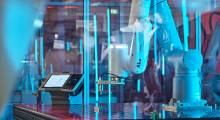6K and 6K Additive, a developer of microwave plasma technology for the production of advanced materials, has been awarded a Phase ll SBIR program from the Defense Logistics Agency (DLA), following the success of its Phase I. The Phase II program supports the development and commercialization of a domestic and commercially scalable supply chain for high-performance metal powders from scrap sources.
Using 6K's UniMelt microwave plasma platfrom the program will demonstrate 6K's capability to source, process and reclaim nickel superalloy scrap components, shop scrap, and used powders for conversion into aerospace grade powders. The new powders will be used to additively manufacture real-world, discrete printed parts that will demonstrate functionality in test beds or systems.
“As a company we are certainly pleased with the award, but more importantly, we're proud as an organization to help our country create and control a domestic supply for alloys such as nickel used for emerging production methods like additive manufacturing,” says Dr. Aaron Bent, CEO of 6K. “The recent COVID 19 pandemic highlights the importance of controlling supply chain and the renewed need for domestic production to avoid interruption of critical supplies.”
6K's UniMelt plasma production system is capable of converting high-value metal scrap of numerous forms into high-performance metal powders for additive manufacturing, metal injection molding and other powder metallurgy production techniques. And in by doing so, provide access to a vast domestic supply of strategically important metals and alloys such as nickel and titanium from machine shops, boneyards, and sources of other used materials critical to the mission of the modern warfighter.
The 6K process cleans, prepares and spheroidizes scrap alloys into quality powders with performance said to be beyond atomization technologies. This process will provide the US military with a secure, traceable domestic supply of critical materials while eliminating performance anomalies due to questionable sourcing from foreign supply, the company says.
6K has worked with several members of Congress gaining support for the company's efforts in using defense scrap material as feedstock for the UniMelt process in support of reducing the dependence on foreign supply.
Congressman Guy Reschenthaler commented on 6K's efforts in this area, “Southwestern Pennsylvania's job creators, innovators, and hardworking employees are critical to our national defense and efforts to provide vital resources to our warfighters,” says Pennsylvania Congressman Guy Reschenthaler. “I was proud to secure funding to reduce dependence on foreign titanium and utilize American ingenuity to protect our national security.”
6K has recently commissioned its new 40,000-sq.-ft. metal powder production facility and will begin shipping traditional powder products in the fall of 2020.
Superalloys are used in critical propulsion and heat mitigation components in the hottest, most corrosive, most demanding components in aircraft and rocket engines, gas turbines, oil and gas equipment, and heat exchangers. The US DoD will benefit in several ways through the program:
1. Reducing risk of dependence on foreign supply.
As there is constrained domestic availability of strategic metals such as superalloys, utilizing materials from the nation's boneyards and machine shops—end-of-life components, shop scrap or used powders—for conversion into high quality materials provides the US military with a secure domestic supply of critical metals.
2. A closed loop enhances security.
Of crucial concern is the quality and consistency of foreign sourced materials. Recycling previously qualified DoD parts, shop scrap and used powders creates a closed loop with material' quality being known and traceable. Unexpected performance anomalies due to questionable sourcing can be prevented.
3. Advanced systems faster to the field.
Quality recycled materials will help the DoD to develop and adopt advanced additive manufacturing, metal injection molding and powder forging processes more quickly creating parts with totally novel functionality, reducing engineering cycles and accelerating “make-to-fly” cycles. This translates to enhanced lethality with reduced costs.
4. Managing costs while maximizing quality.
Using already certified scrap as raw material dramatically reduces the material cost of goods for manufactured parts and ensures they meets the desired specification. Powders from scrap will leverage DoD investments by reducing cost of end-system part production with compelling ROI.
Sources: Press materials received from the company and additional information gleaned from the company’s website.
About the Author
Press releases may be sent to them via [email protected]. Follow Robotics 24/7 on Facebook
Follow Robotics 24/7 on Linkedin
Article topics
Email Sign Up















